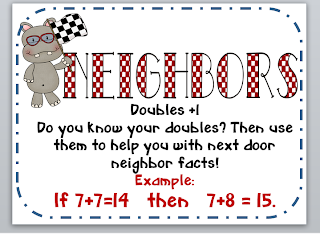 |
Yes, well we are relying on technology to support learning in the classroom but hopefully we are not to this point yet! Research still shows and experts still agree that the ability to recall math facts fluently is necessary if students are to be successful in attaining higher-order math skills. I have seen how slow math fact retrieval can impede my students' progress. I like to say that authomatic recall of the facts "frees the brain" to be able to focus on more complex math thinking tasks.
So how can we help our students develop their math fluency? I believe in a strategic approach to teaching math facts versus memorization of isolated facts. I also think it is critical that students begin to generalize their math fact knowledge. In other words, I want them to be able to apply these strategies and extend their thinking for use with larger numbers. For example, I want them to see the connection between 4+5, 40+50, 400+500.
Because future math success is dependent in part by this immediate and effortless recall of facts, I do spend the first couple of weeks working on a review of all these strategies into my math block. It is review for third graders so I just devote the first 15 minutes or so on a strategy. I use visual representations when covering each one: number lines, ten frames or triangle fact family cards allow students to "see" the math. Students then create color coded math strategy flash cards to use for fluency practice during center time.
Here are the strategy posters that I will post this year for reference. I will shrink them in size and students will also get a copy to glue into their math journals. We will add examples in our journals and will be sure to extend that thinking for each strategy by including more complex examples.
Here are some examples of the strategies we cover. The entire set is available free on TPT if you are interested in downloading them for yourself
We assess student progress once a week with a timed math check up. Students take ownership of their learning by graphing the number of problems they were able to answer each week. We stress that PRACTICE MAKE PROGRESS. If the graph is not showing an increase, then more practice needs to be done.
Have you explored this fabulous site? WOW...lots of great math materials to download for free.






 youngdor8@gmail.com
youngdor8@gmail.com



















